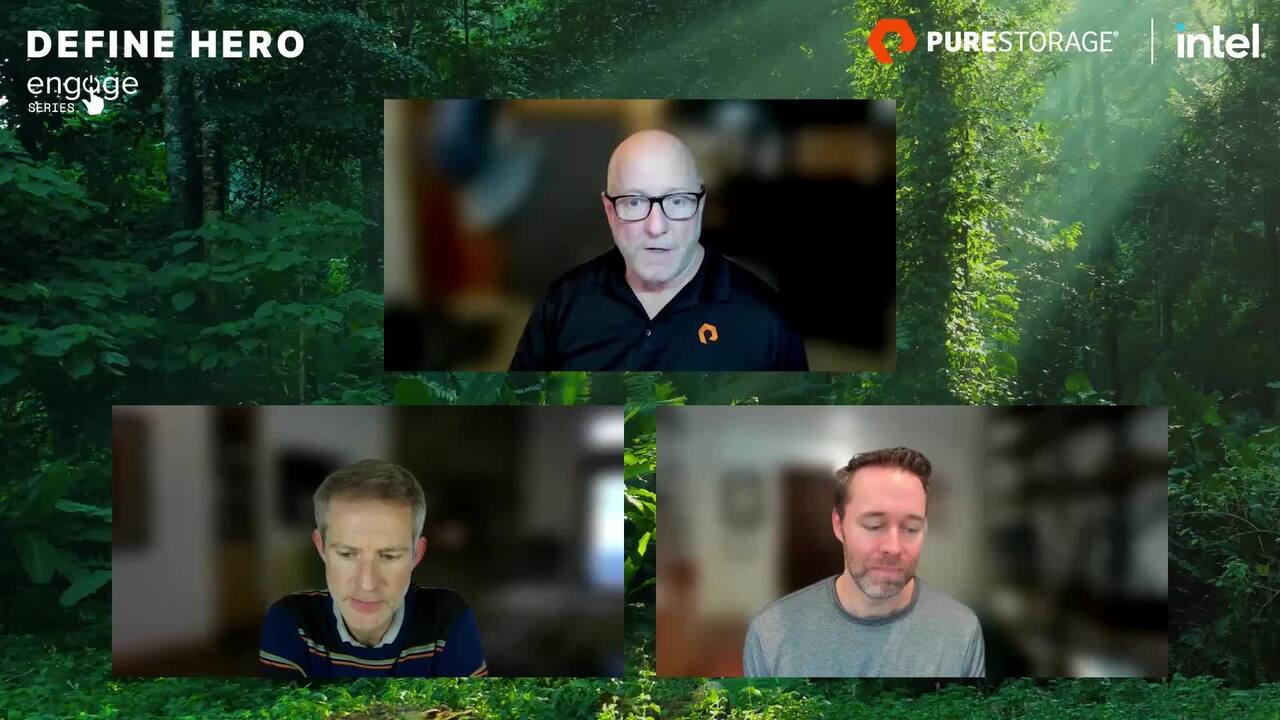00:07
Global inflation is driving energy costs higher at an alarming rate. This is happening at a time when most companies are focusing on sustainability and E. S. G. Efforts that's environmental, social and governance both to reduce their impact on the environment and to improve their brand and attract customers.
00:28
The net result is that organizations are looking to get cleaner cheaper energy supplies while lowering their overall energy demands now. Too often I. T. And data storage in particular aren't thought of when considering ways to save on energy consumption and to increase an organization's sustainability.
00:49
The immense amount of data being produced, stored and access today already requires 1% of the world's total energy output and as the volume of data and the ways organizations look to leverage it continue to skyrocket. So are those energy demands complex and outdated I. T. Infrastructure only puts more pressure on an organization's energy demands but there are options that provide not only the power to
01:17
manage and access your data but also to save on energy consumption and its costs with the right approach. One that leverages highly efficient data storage technology. The world can reduce the amount of energy needed to store data by 80% and do so well into the future with much longer lasting infrastructure. Okay please let me introduce our speakers first.
01:43
I'd like to welcome erIC do our VP portfolio marketing at pure welcome eric kevin thanks for having great to have you here and please also welcome Patrick Casselman Senior Director sustainability Center of Excellence with Intel. Thanks Patrick thanks a lot gentlemen thank you both for joining us here today. So eric I'd like to start with you and to get your take on the current landscape for rising
02:12
energy costs and its impact on I. T. Um what do you see right now that organizations are facing when it comes to energy costs? Is it affecting just a few key regions or is it is it being felt more globally? Well, you know, it's a big macro trend right now happening um around the world. But specifically, you know, if you look into europe and the U.
02:36
K, like, let's forget about corporations 19 like consumers in europe right now are seeing 50% increases in their energy blue. Uh they're expected to see another 80% increase in their energy bills over the winter when we all have more than one. This is being, you know, not only UK, we're seeing it throughout Western europe Germany is reporting the same type of things now, those are the consumer prices that are getting.
03:00
Of course they're not unique, Right. That's going to show up in corporations instead of seeing spikes in energy costs predominantly in europe. But we're also seeing it around the world as we look for, you know, as as we have china geopolitical issues that are disrupting images lodgings. Right. Right, definitely.
03:21
And uh so, Patrick, do you agree with that? I mean, is that really what you're seeing as well? Yeah. Eric you're you're totally right. I think we see the same the same trends happening in europe. I think just to add on what you said, the other factor is as you know, the government's asked for for for austerity around energy.
03:39
Those requests come back, we see those requests coming back to to the enterprises to say, hey, how do you, how are you conserving and what are you doing, you know, to pitch in so that we can help help these people pay their bills. We gotta, we gotta conserve what energy we have. So it's really in focus. So that brings up a great point, Patrick, it sounds like it's not just a matter of rising
04:01
costs. It sounds like there's also a concern about access to energy supplies as well, is that right? Yeah, I I think I think you have it and and and that goes beyond the media. I think Covid has exposed all of us to sort of the inherent risk in the supply chain that we may be for granted before and didn't know were there.
04:19
And so again, from from my view, we see these uh, our customers and tells customers, looking looking far and wide at those supply chains, not just what's coming in, but how they're gonna make sure they have, you know, energy security long term, so that they can deliver to their customers. Yeah. So erIC are you seeing something similar as
04:40
well? That that whole idea of energy security. Yeah, we've seen in the news, um, you know there's a few large hyper scaler is that we're looking to to deploy data centers in Ireland the irish government said hold on not so fast. We're not sure we can secure the energy for you to build those data centers based off the parameters and specifications that were created. So you know I think Patrick is absolutely right.
05:07
This is something we just all took for granted. Especially in north America we flip on the switch and in the spleen. Both Patrick and I come from the pacific northwest we have super clean energy some abundance. Uh And now suddenly it's like whoa you know the supply chain has really come under scrutiny Uh and a bunch of interesting ways. And so you know this is really putting the
05:31
energy conversation in in the bordering discussion where you know certainly you know 10 years ago, five years ago, two years ago. This just wasn't this wasn't happening. Well that yeah that that then begs the question, how much energy does I. T actually use and how fast are those data demands growing? Yeah I mean you know kevin you said earlier, you know around 1% we've seen around 2% around
05:59
um uh of of I. T. Stand up for just storing the data that's a pretty conservative number to start looking at like everything that goes around it. So you know we are here, we did a deal with meta earlier this year uh and one of the reasons why meta decided to build up your was specifically because they could get they didn't have to build a new building. Um It wasn't so much the cost of the data
06:27
center pieces of it. That was the infrastructure that sentence sent around it. And I think that as we look at the total cost of what it takes for us to have, um you know, the energy that it takes for us to run, I thi I think we're going to find that it's been it didn't cost and that's gonna be much bigger than when you realize that's a really good point.
06:50
The the whole idea of it's not just the initial acquisition cost, it's as operating costs over time and energy is now becoming a bigger and bigger slice of that. Um Patrick, what what what are you seeing out there and what's what's intel's take on that? Well, yeah, you quoted that that 1%. And then if you think that's for we think of that number is for the the the enterprises themselves.
07:14
But then if you look at the network, it doubles that 1%. And then if you look at the way that data is growing, you know, I d C says it's growing 65% a year, which is just incredible. That means by 2030 it's gonna double or triple. So that could be 6% of world energy usage, you know, in in our industry driving that it's just it's just a mind boggling um go like it's
07:36
a little bit scary but I think it's also a big opportunity and I I think I ran across a Gartner study that showed exactly what you were just saying that even if you just look at the storage side of things it's definitely going to double um you know from something like 20% of that power of of the 1% 2% 3%. You know that's just data itself is is going to to grow exponentially. So it it definitely sounds like a pressing
08:05
issue. So then eric I'll toss it back to you. What can I. T. S role be in this move towards a more energy efficient infrastructure or what should I. T. S role be? Yeah I mean it's certainly evolve. E the fact that we're having this conversation right now just speaks to the evolution of it. I think we all remember back in our C.
08:25
R. T. Days the energy saver thing the monitor would like automatically power off after a couple of minutes and you know that was pretty cool. Uh You know I think the first thing for I. D. To realize is that um you know what is the true cost what is the true energy costs of running uh information technology? I think it's you know just even having that awareness and asking those questions is almost
08:52
better than the answers and you know it's interesting, like a pure and I'm sure Patrick you've seen it as well. I'd be curious about this, but you know, for years we've always had within an RFP, you have like E. S. G. Kind of, I don't want to say check box, but it's kind of a check box. Like, hey, you know,
09:09
how are you, how are you scoring on these things? The shift in 2022 has been dramatic. The level of detail that customers are asking around BsG, particularly under the energy energy part of it. And Patrick, I don't know if you guys have seen the same thing on your side. Absolutely. There's that that same shift is it's a real
09:35
shift and I think people are still internalizing that that's really happening. I think, I think you see it eric we see it, but you know, I'll be honest, I'm still convincing some people at intel that it's that it's happening. But the data is on my side. Uh, I think this is driven by the regulatory environment, you know, before people were publishing reports,
09:52
but now there are regulations behind it. I think um consumer mindshare shifted as well. Um and uh there those as, as other companies as our customers are publishing their csrs, they're really being held accountable to the claims they make and so it has to be real, it can't be green washed. Um and I think there's a responsibility for our industry to do this the right way. Um and it's,
10:18
it's a really big opportunity. Yeah, that's, that's really interesting, Patrick, it sounds like there's a combination of both carrots and sticks being involved in the, in the move toward, you know, more energy efficiency. I mean obviously the the carrots of creating a better brand and one that appeals to consumers that are worried about sustainability.
10:40
Um you know, and of course the operational savings that you were talking about erIC but then that, you know, compliance and regulatory, which we know we've seen a lot in, in europe. ErIC to your point of the checkboxes on RFP is that, you know, I I used to see that five years ago, only out of europe and now I see it everywhere, so I completely agree. Um well then what um what does an energy
11:06
efficient infrastructure look like then, especially around storage and how big are those potential savings ERic, I'll toss that over to you first. Well, I mean, you know, you data storage has been an interesting market for, you know, for decades and it's not one where people looked at it and said, hey, how do we make this more energy efficient? You plug into hard drives?
11:31
It's been around and store some files on, you know, as long as the storage and working kind of like the hitting pasta, really not as much. Um you know, the The way that we've approached it, a pure wasn't necessarily looking at it from energy savings um kind of approach we we looked at it, you know, appears about 10 years old, 12 years old.
11:56
Uh and you know, back when we decided hey we want to have an all flash status in flash media was so expensive that we had to do everything possible to make it as efficient and effective as it could be. And that included like how how much space does it take? How much energy did it make the type of software? And so you kind of fast forward all that design
12:19
like that's that's like native design thinking and you know you take it into the days. Uh So what you end up road is around 80% save up to about 80% of the energy that you normally need. Um And so that does two things. One uh lowers you build, right? It just saves you money uh Like buying a better refrigerator, you know one that takes 80% less, just cost 80% 1.
12:46
And it's kind of ridiculous if like I. T started mapping out like the true cost of I team, like it shouldn't cost you more to run your data than it does to buy the the array itself. Um So that's kind of number one, but number two. Um and this is I think once we get through this this kind of tough spot we're in right now is it gives you options and I think I t In general needs to realize the less energy they
13:13
knew the more options are going to have. Uh, I'll give an example um, Sierra Nevada is uh, you know, brewery in northern California, they switched everything over to solar home now years and years ago we did a case study with them and they said how much money they saved on electricity. But now the question is that there have moved all over on solar.
13:38
It's more like how much less do they mean because they can now call it from renewal? Right, So that gives them an optionality. Right? And and I think options for enterprises moving forward is going to be to the strategic advantage. That's a really interesting point there. The the idea of it's not just the savings but the fact that given the uncertain
14:02
situation that we're in right now with some at least some regions having problems accessing or depending on the size of the, of the infrastructure, having access the ready access that we're all used to um, having those options for the future is is sounds like it would be a pretty big deal, you know, um, to hedge your bets for the future. Patrick, any any thoughts on that? Yeah, the there's a lot of savings to be had um,
14:31
you know, at intel, we look at, we have the ability to influence the platforms in the in the in the infrastructure and how it's built and sort of the standards and architecture for those things. So we look at the same kind of things that ERIC mentioned to improve the efficiency of what you have, whether that's um emerging trends like 48 volt power liquid cooling I think is going to grow in importance over time here in the
14:57
data center um there's a massive opportunity on software tuning and ERIC touched on a little bit of that. The pooling and utilization we have in our data centers today isn't really good and we see when we bring uh engineers in or you bring the right experts into to do tuning and just do some simple measurement of what you're consuming. You can make some really big games. We have, we have software teams work for a
15:20
couple of weeks and they, you know, they cut the power in half. So there's there's a lot of opportunity out there with the right focus. Well, I want to drill in on that a little bit because the great thing about having you here, Patrick is you know ERic and I tend to put the blinders on and really just get focused on data storage and you've got that cross stack view uh coming from intel and and you know,
15:43
one of the things that um in a prior conversation that came up was the comparison with laptops, you know, ERIC mentioned the monitors were all used to seeing the energy star label on there, you know, it feels like we hear about energy efficient laptops and stuff all the time. And yet it seems like the, you know, the big iron stuff in the data center has kind of been a little left behind.
16:06
What's you know, what, what do you think the rationale is behind that? Yeah, I've like it's a good, it's a great question. I've been able to work, I've been lucky enough to work on both the client side, the laptop side of the world here at intel in the starter in my in my career and we had a really convenient uh proxy in in the laptop world with battery life,
16:29
right? We've spent 20 years here optimizing for better life because that led to a better user experience, right? People want their laptops to last all day. You don't, we're all working from home now it seems. But in the passage, you have to charge between meetings as you went from room to room.
16:43
Um that ends up being a really big proxy as you may optimize better life. You're also optimizing power consumption. And so that that helps us a lot. And if you look at laptops and the carbon footprint of those laptops, most of that carbon footprint is in the manufacturing the laptop. So there, you know, we need to focus on how we, how we manufacture our products to be more
17:03
green, more sustainable and how we build those architectures to have less energy input that we've had this 20 years of engineering work, we've done to really make what comes out of the wall um as efficient as possible on the service side, the focus has been different. It's been on how do you get the most performance and power was really kind of an afterthought, to be honest. Right?
17:23
There weren't the same the same energy, there's no energy star label for for for in the data center. Um so it's just a big opportunity for us here to really take a look. And I think this environment we've been talking about with the environment really changing. And because of all the factors, we've talked about this new sense of energy and security in the supply chain.
17:43
Um the new regulations requiring, you know, people that really back up the claims they make in their CsRS, uh they're gonna go and look at at doing this optimization and there's so much green field. If you look at the steps we took on the client side and better life and power consumption, we can, we can just do amazing work over the next five or 10 years now that we're focused on it and it's,
18:05
it's not a case of it being hard, it's just a case of something we haven't, we haven't worked on yet. I think we're gonna get there. Right. So the stick was coming from the battery life which which forced the efficiency and what we need is that that same thing in in the big iron world. I'm sorry eric did you have something else to
18:23
come? Yeah it's just kind of building off of what Patrick was saying is not only is it a Greenfield there's there's literally no trade off right? It's good right? Uh And as long as you know human beings are gonna hang out on this planet I think we're gonna want data like it's not gonna go away and it's gonna keep growing and so there is this
18:47
idea of like well you know we need to find a better way a more efficient way to store the data whether it's in the cloud or as an entree more USB stick in the side of the computer. Um because it's just an example. Uh And Patrick I think your laptop example is spot on. Um we have the engineering focus on it now um and you know hopefully the people who are buying storage and the IT architecture are
19:17
making decisions that are gonna help with that exponential growth for not just this year or the next 10 years of over 10, 20 and 30 years after that. So Eric I last question then for you so how does pure actually deliver that you know highly efficient infrastructure data storage that uses 80% less energy. We do it well um you know you know the
19:49
simplest way without getting into the tech of it is you know I look at it in three ways you know we take, you know, I have to space right off the bat right, so that the consolidation within the medium is really important, particularly as flash becomes more dense and we don't want to have density at the risk of performance, but if we can get more on smaller things, we need less physical space and
20:17
that conserves energy. Just that simple matter. The second thing is it just takes to fit the power so half the space with the power uh and that, you know, that's that 80% uh you know, for those of you who want to look across the portfolio uh some of them are above 80%, somewhere below, but basically 80% is the, is the line that we use uh across um and then
20:41
finally, I think the other thing on the pure side is it just takes a 10th. Uh and and that means that data storage should be thought more around how to access data and automate all the storage areas so that you can start surfacing and thinking about these bigger problems that we've been discussing. Great, great. And you know, by the way, I didn't mean to put
21:04
you on the spot from a technical standpoint because we actually do have a technical deep dive on how we deliver the 80% savings coming up on December 15 and we'll have more on that that follow on event at the end. But unless there's any other parting shots or thoughts from you too, um, I would like to thank you both for uh, this great conversation, I really appreciate it. Um a lot of,
21:31
a lot of great stuff coming through and um, thank you for your time, ERic and Patrick, thanks a lot. Always fun to talk to you guys. Thanks. Thanks again.



